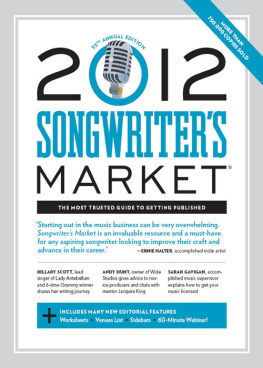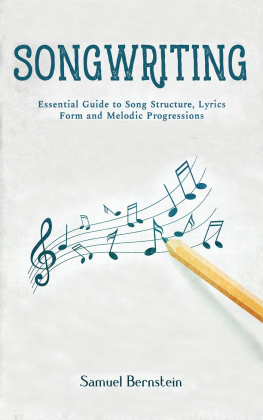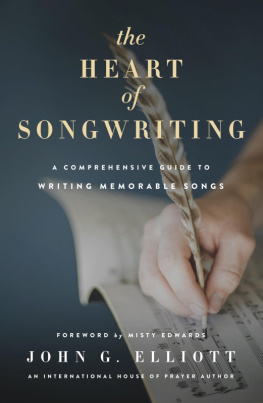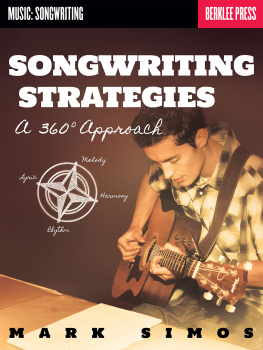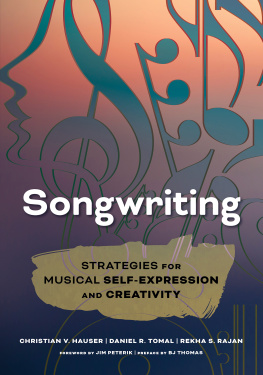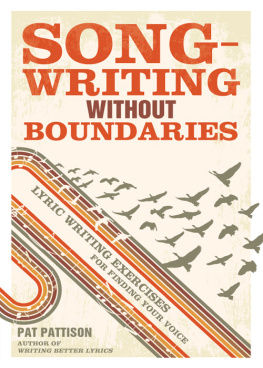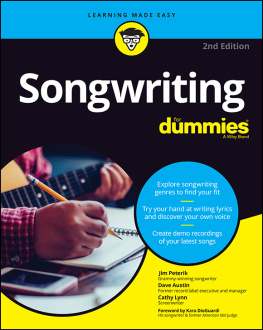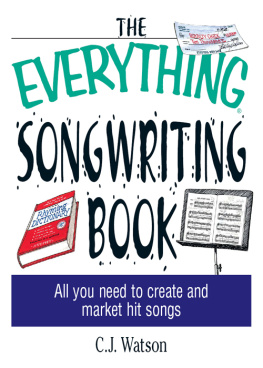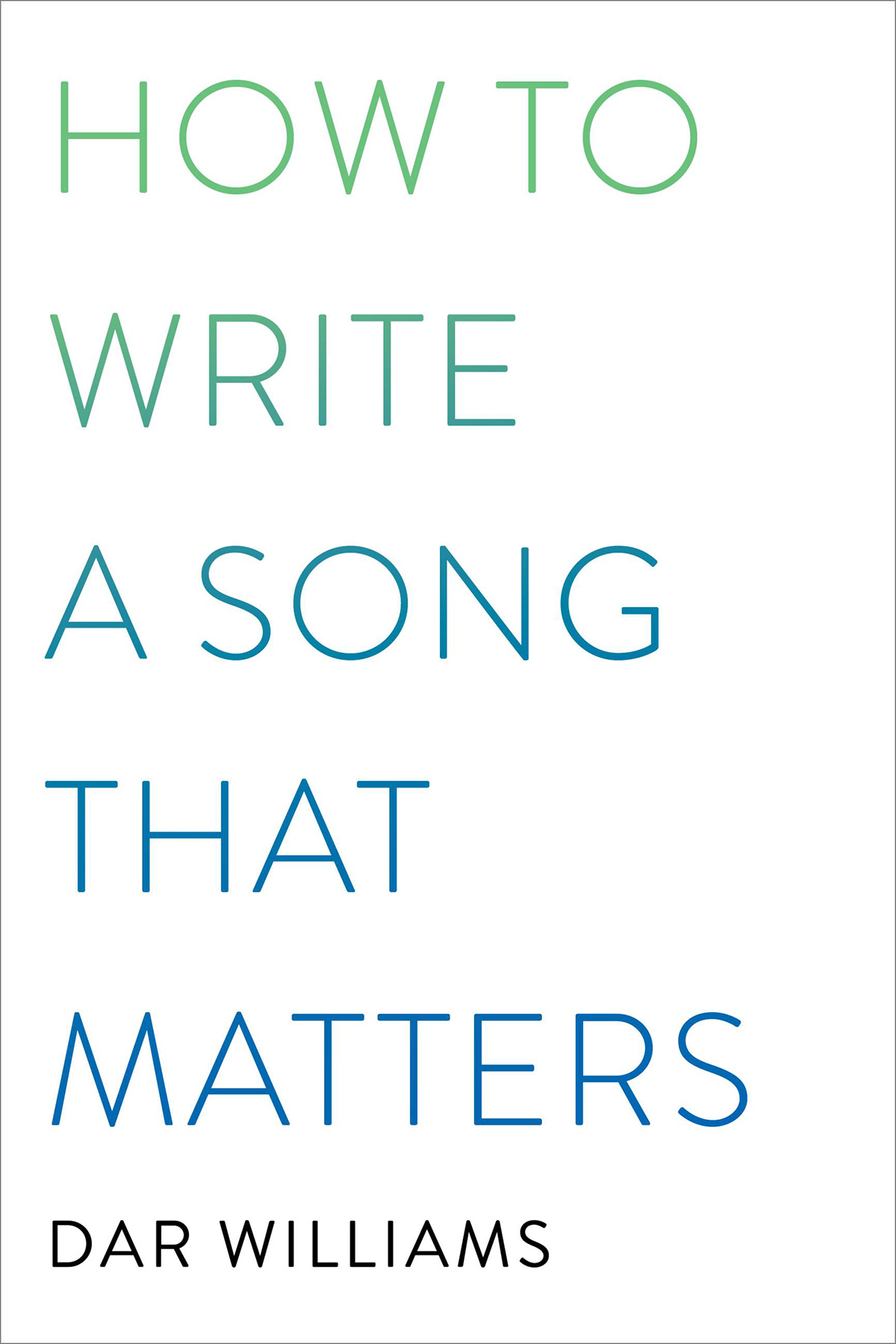Long ago on a hot, late summer night I was driving alone on a beach road, the shadows of my headlights slicing the humid air amidst a million bugs in V formation, while the local radio station played a song called Are You Out There by Dar Williams. It was one of those startling, magical instances where the song I was hearing made me feel more alive and less alone, the way the best songs do. And I felt connected to something invisible and mysteriousthat whoever wrote that song knew what I was feeling. When Dar and I became friends years later, that was the first thing I wanted to share and to thank her forfor writing a song that mattered to me. In this beautiful and wise book, she explores how a song can matter in many different ways, to different people, for different reasons. The wisdom and the lessons she shares will illuminate not only the world of songwriters but anyone who seeks the sustenance of a creative life and practice.
There are songs that have changed my life, described my life, upped my life, saved my life. I wear those songs like charms on a bracelet. Several of those charms were written by the glorious Dar Williams. As Dar says in this gem of a book, How to Write A Song that Matters , When I hear a song that I love, something catches and holds me the way gravity holds us to the ground. And then she takes us deep into the process of creating a song (or a poem, a book, a pot of soup) so that we too can offer others the charms they need to ground their lives with meaning a healing charm, a power charm, a beauty charm. Thank you, Dar. Ill keep coming back to this book for inspiration and direction.
Elizabeth Lesser, cofounder, Omega Institute, and author of bestselling books including Broken Open and Cassandra Speaks
What I Found in a Thousand Towns: A Traveling Musicians Guide to Rebuilding Americas CommunitiesOne Coffee Shop, Dog Run, and Open-Mike Night at a Time
Amalee
Lights, Camera, Amalee
Copyright 2022 by Dar Williams
Cover design by Terri Sirma
Cover copyright 2022 by Hachette Book Group, Inc.
Hachette Book Group supports the right to free expression and the value of copyright. The purpose of copyright is to encourage writers and artists to produce the creative works that enrich our culture.
The scanning, uploading, and distribution of this book without permission is a theft of the authors intellectual property. If you would like permission to use material from the book (other than for review purposes), please contact permissions@hbgusa.com. Thank you for your support of the authors rights.
Hachette Books
Hachette Book Group
1290 Avenue of the Americas
New York, NY 10104
HachetteBooks.com
Twitter.com/HachetteBooks
Instagram.com/HachetteBooks
First Edition: September 2022
Published by Hachette Books, an imprint of Perseus Books, LLC, a subsidiary of Hachette Book Group, Inc. The Hachette Books name and logo is a trademark of the Hachette Book Group.
The Hachette Speakers Bureau provides a wide range of authors for speaking events. To find out more, go to www.hachettespeakersbureau.com or call (866) 376-6591.
The publisher is not responsible for websites (or their content) that are not owned by the publisher.
Interior illustrations by Katryna Nields.
Lyric credits:
Cold Missouri Waters by James Keelaghan Tranquila Music, 1995
On the Eve of the Inaugural by Peter Mulvey September Dawn Music (ASCAP), 2021
Cant Fall Down by Jim Infantino Funny/Not Funny Music (ASCAP), 1995
The Drivers Song written by Bill Morrissey DryFly Music, 1989
Chasing Daylight by Lisa Forkish Lisa Forkish Music, 2014
Library of Congress Cataloging-in-Publication Data has been applied for.
ISBNs: 9780306923296 (trade paperback); 9780306923289 (ebook)
E3-20220727-JV-NF-ORI
For Raquel Vidal, Rick Gedney, and Michele Gedney, my pillars.
And Toby Shimin.
INTRODUCTION
When I was a boy
The phrase popped in my head with a little bit of melody. I knew it was going to be a song. I understood what I had to do. I had to clear as much time and space around this moment as I could, getting a sense of why the phrase had struck me. I had to approach this short line of music and lyrics with confidence, but also with care, listening to the song as I created it. What clues was I getting from the words, the rhythm, and the feel of this phrase? Where was it taking me?
I gently inquired if When I was like a boy might be more accurate. Isnt gender just a construct? Is there such a thing as being a boy these days? The new phrase, swirling in my head, responded gently. Its not when I was like a boy. Its when I was a boy.
My friend Jaim Morton had taught me a new guitar tuning called DADGAD. I played the phrase on the guitar and started messing with the chords around it. I didnt know their names. Jaim had just taught me how to go up and down the fretboard with the same chord shape, so thats what I did.
Over the next few weeks, with and without my guitar, I started pulling in information, writing couplets, then verses, about that time when I was a boy. Id just heard Judy Kayes version of a Leonard Bernstein song, Dream with Me, sung by Wendy to Peter in a telling of the childrens story Peter Pan . Dream with Me suggested that Wendy was a little in love with Peter Pan, but she also loved being one of his fellow adventurers. I was that Wendy, at twelve, a little in love with the boys who tackled me in football.
I compiled other memories of being in the woods, being on a bike, and being with the other boys. I wrote two verses over two months. Each verse included some aspect of my boyhood freedom, coupled with my limitations as a grown woman.
The feminists are going to kill me, I kept thinking. I was living in Northampton, the lesbian mecca of Massachusetts, its own Neverland for girls who didnt need boys at all. Why would a woman call her childhood her boyhood? But the phrase was insistent. I kept on listening and letting the song unfurl.
Id come to the third verse. How would I end this song? What was the truth? What really happened?
I realized that even though I had lost some of my childhood freedom as a woman, I knew I was part of a movement that was bringing more freedoms and rights to more women. Should I end the song with something about the womens movement or some other feminist theme?
I also started thinking about how the joyful memory of being a boy was something I could talk about with some of my friends. Feminist ideology aside, I had compatriots whom I knew would understand this gender experience. At that moment, my mind brought me to the subject of the final verse.
I was going to turn the focus on men.
Scores of male friends had confided in me over the years. Their common refrain was Im not like other men, and I cant talk with other men about it.
And there it was. I knew how I was going to end the song. The narrator would be hanging out with a man. He would talk about what he lost when he became an adult, and he would begin by saying, When I was a girl.
My musician roommate, a radical feminist, heard the song and said, right off the bat, Whoa. Why did you end with a dude?
But this was the song I felt compelled to write, so this is the song I wrote.
A few days later, I was a last-minute addition in a round-robin concert, and we were playing songs based on phrases taken out of a hat. One scrap of paper said, Come up to my treehouse. We murmured among ourselves, and my friend said, Why dont you play that new one?


